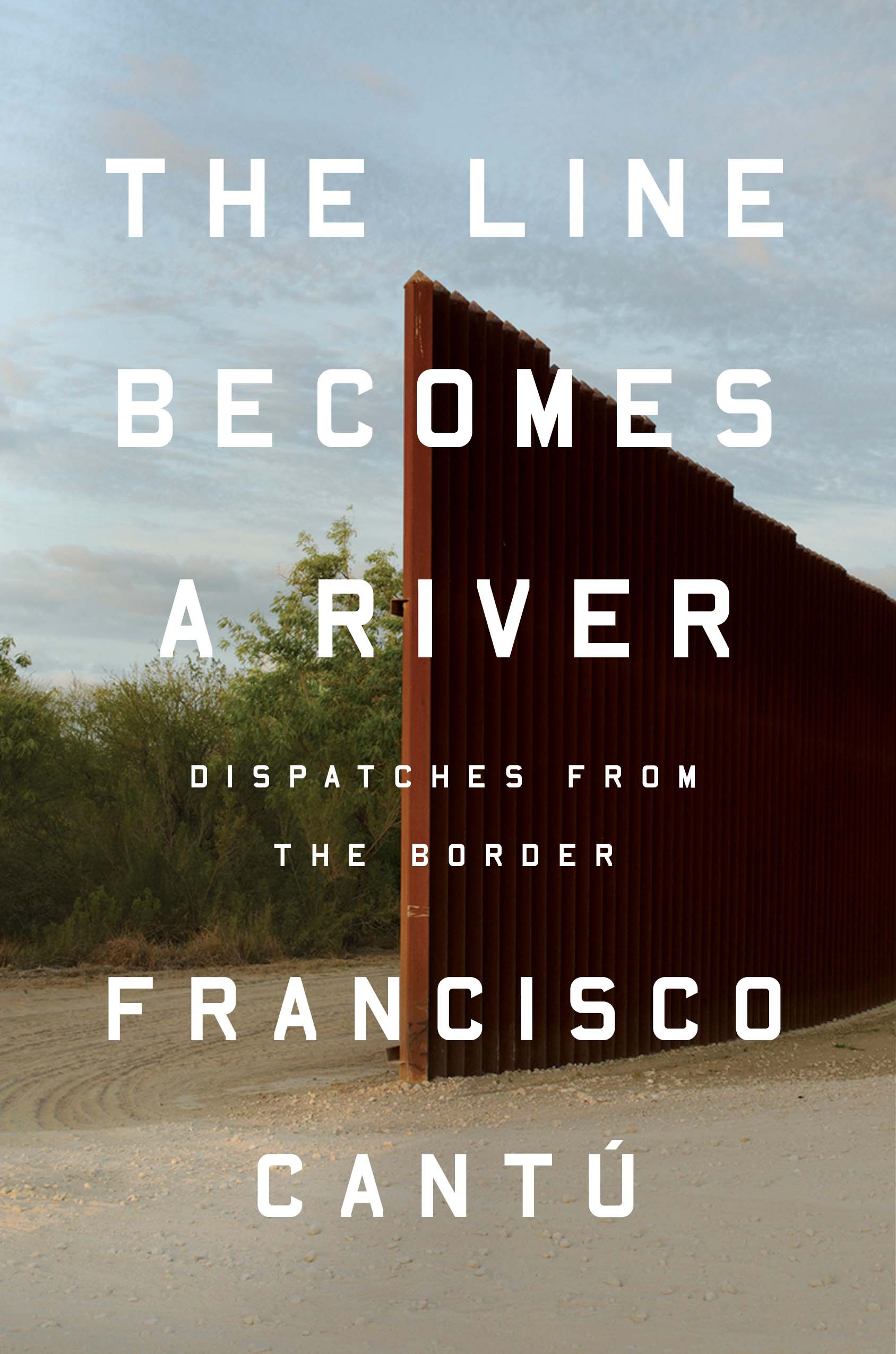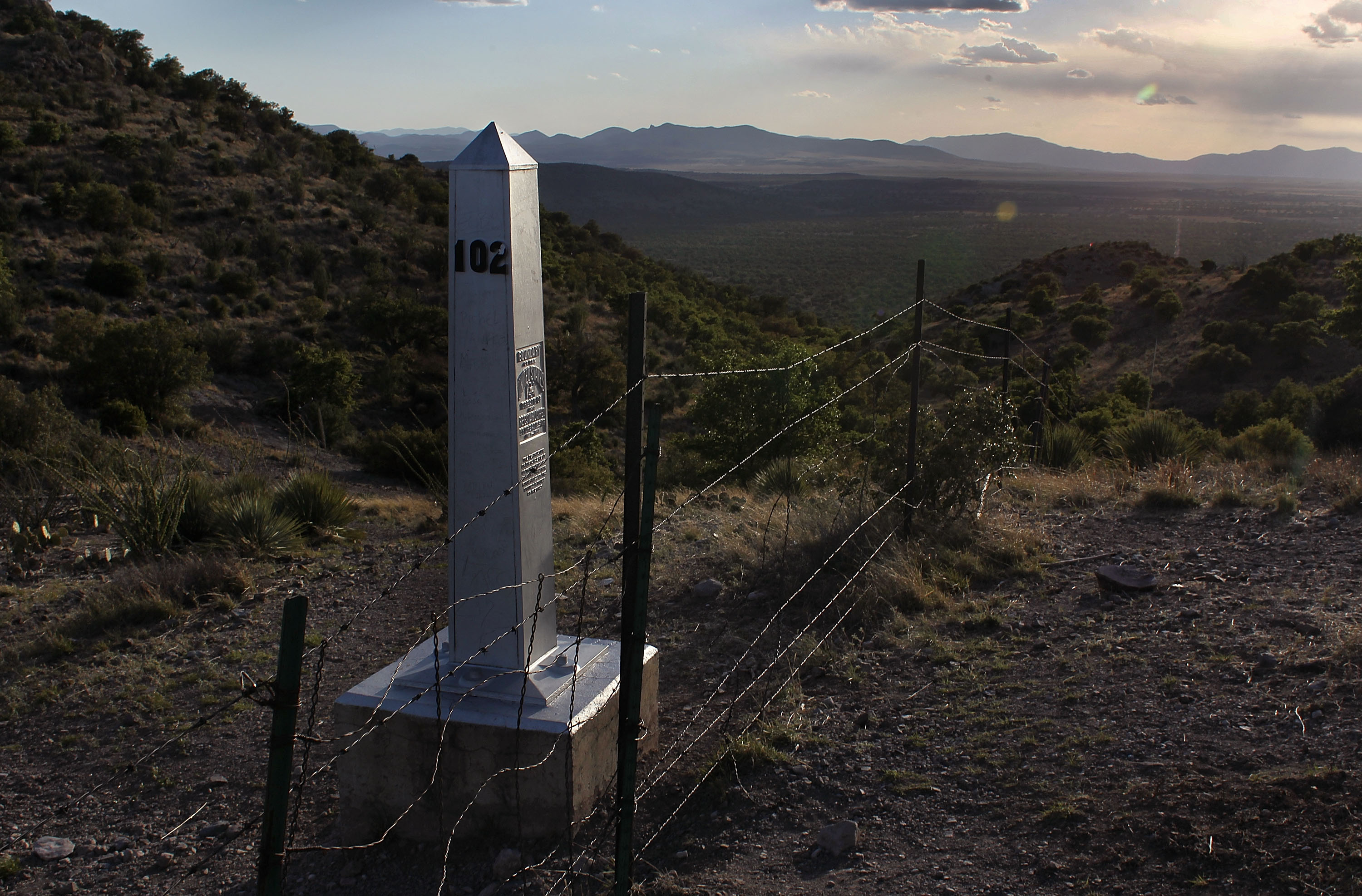
(Photo: Riverhead Books)
At the Coronado National Memorial south of Tucson, not far from where Francisco Cantú grew up, iron obelisks mark the border between Mexico and the United States. In his debut memoir, The Line Becomes a River: Dispatches From the Border, Cantú maps the origins of these figures, which plot a 675-mile-long international borderline from the Pacific coast to El Paso, Texas, before dipping toward the Rio Grande and joining the river.
The modern-day U.S.-Mexico border was negotiated in the early 1850s, but these monuments appeared three decades later, when a reinvigorated boundary commission met to deepen the line’s physical impression on the terrain; some survey parties swelled to nearly 60 people, including engineers, astronomers, topographers, and a small procession of lumbering mules. Two hundred fifteen new obelisks were subsequently planted across the American Southwest, marking, for the first time, a perceivable boundary for anyone crossing from one nation to the other. The obelisks have since been shadowed, sometimes literally, by intermittent stretches of corrugated metal fencing and a deadly set of border enforcement tactics.
Cantú’s grandparents migrated north from Mexico, he grew up near the border in Arizona, and he studied border politics as an undergraduate, but Cantú’s closest relationship to the “line” in the title of his book was when he served as a Border Patrol agent in Arizona, New Mexico, and Texas from 2008 to 2012. His memoir is concerned with cataloging his time as an enforcer while also confronting his complicity within an often hostile, often cruel U.S. immigration system. The resulting narrative braids Cantú’s personal guilt and trauma into the larger historical and sociological conditions that have made border enforcement so violent and problematic today. Cantú’s memoir refracts these issues through his own experience, offering a look at the vicious cycle of violent institutions producing violent enforcers, who in turn create a violent culture with little accountability.
In the memoir, after finishing his undergraduate studies at American University, Cantú is propelled by a dominating curiosity with the border, and desires to understand its physicality. “I saw it as an extension of my education,” he tells me over the phone. “I had all these big questions, but once I stepped into the training program, it all faded away. You had to just wake up the next morning and do your job. There’s no culture of talking about doubts or trauma.”
Cantú’s mother—herself a former National Parks employee, who repeatedly appears in the memoir as a voice of reason—warns him against joining an institution known for its casual violence. He assures her that his head is in the right place: “I might not agree with every aspect of the U.S. border policy but there is power in understanding the realities it creates,” he reasons. Although well intentioned, the words telegraph a somewhat naïve faith in the Border Patrol as an institution—a view that ultimately backfires on Cantú when he’s put through the wringer as a 23-year-old trainee.
Cantú, much like many agents who joined after 1994, was required to carry out the Patrol’s then-recent Prevention Through Deterrence strategy. The deadly Clinton-era tactic encourages agents to push migrants to barren and isolated terrain, weaponizing the Southwestern landscape against them. Though contact between agents and migrants may have reduced, border deaths have risen, with agents often destroying life-saving resources left for migrants by humanitarian groups such as No More Deaths and La Coalición de Derechos Humanos.
Some of the most polarizing sections of the book situate Cantú as a complicit witness, as he learns about these tactics and the twisted logic agents use to justify them: “It’s true that we slash their bottles and drain their water into the dry earth … but the idea is that when they come out from their hiding places … they’ll realize their situation … and they’ll save themselves and struggle toward the nearest highway or dirt road to flag down some passing agent….” You can almost watch Cantú trying, and failing, to rationalize what he’s seeing in real time.
When I ask Cantú about this section in particular, he tells me these stories were passed around the patrol; that’s where he heard them. “It was against Border Patrol policy, but it wasn’t against Border Patrol culture,” he said. “We were tacitly taught that it was an OK thing to do.” The scenes still rattle Cantú, years after leaving the Patrol, and they permeate his narration, leaving the reader with a deeper and more personal sense of discomfort with the Patrol’s work. He places these instances early in the book, as if to confront readers directly with the ugly face of something he’s still trying to reckon with himself. “If we’re going to have a meaningful conversation about immigration reform,” he tells me, “the first thing that has to be addressed is Prevention Through Deterrence, and the humanitarian crisis it’s created.”
Though Cantú’s narration offers an implicitly progressive viewpoint, the very nature of a project like this forces readers to evaluate his own moral position as a narrator. The issue has haunted the book ever since its release—for some readers, a book written by a former border agent is by definition a morally compromised work, stifled by the conditions of its own existence. By the time readers get a stable sense of Cantú’s point of view, early in the first section of the memoir, he’s already a step ahead, asking what will become a central question of the book: “There are days when I feel I am becoming good at what I do. And then I wonder, what does it mean to be good at this?” There is something astonishingly raw about the way Cantú deals publicly with his guilt here—and the way his lived reality forces him to consider anew his mother’s initial fears. “I know a person can become lost in a job,” she reminds him as the first section of the book comes to an end. “How a soul can buckle when placed within a structure.” This is the beating heart of the book, and it becomes the key to how Cantú interprets his relationship to the border—academically, journalistically, and personally.

Historically, enforcement agents fall all over the spectrum when writing about their experiences: from the critical to the self-congratulatory. A 1959 memoir from Texas Ranger William Warren Sterling begins with a paean to border agents: “My endeavor here is to relate some of the unheralded deeds performed by good Rangers … constructive, benevolent, and peaceful acts … rather than the amount of gunpowder they have burned.” Another memoir, nearly half a century later, from former Patrol agent Morgan Lee II, actually challenges the corrupt institutions that directed enforcement during Lee’s 28 years of service. “The people in this country need to know what is going on on the border, because they’re not being told the truth by the government,” he said in an interview with the Southern Poverty Law Center, referring to the government’s xenophobic impulse to categorize all Mexican immigrants and nationals as “illegals.” Cantú is borrowing from this tradition but resisting it too. “If this was just a book of Border Patrol bar stories, I wouldn’t have written it,” he tells me.
Sterling and Lee’s books are largely locked in the biases of their own perspectives. Cantú, though, invites the reader to meet him halfway: first, by narrating his own experience, and then by weaving together a chorus of other voices that challenge his centrality to his own book. The more deeply researched sections demonstrate the strengths of this approach, especially in Cantú’s analysis of the language that helps humanize border agents and their work—largely by dehumanizing the people they’re policing. Cantú quotes the research of Jane Zavisca, a cultural sociologist who surveyed 10 years of reporting to identify common metaphors used by journalists writing about migrant deaths. These included economic metaphors (“cost,” “gamble”), violent metaphors (“unforgiving weather,” “invading” groups of migrants), and dehumanizing (“lured,” “cat-and-mouse game”). As Zavisca puts it, this language “depicts enforcement agents as humane shepherds tending to a flock.” The book also refers to the work of sociolinguist Otto Santa Ana, who argues against the representation of migrants as “an undifferentiated mass” within border policy—yet another category of dehumanizing metaphor that helps energize dehumanizing policies.

(Photo: Beowulf Sheehan/Riverhead Books)
Cantú’s prose is also influenced by first- and second-generation Mexican-American poets, who he believes are producing “the most urgent writing about the border.” Poet Sara Uribe’s book Antígona González reconfigures the Greek tragedy of Antigone in a modern Mexican context to comment on the filial trauma associated with disappeared and dehumanized migrants. “What thing is the body when someone strips it of a name, a history. … What thing is the body when it’s lost,” Uribe asks. Equally illuminating are the passages that Cantú draws from Dolerse, a book by the poet and essayist Cristina Rivera Garza. Commenting on the relationship between pain and fear among the contemporary Mexican diaspora, Garza posits that “pain not only destroys, but produces reality,” one where isolation and mistrust primarily inform peoples’ social relationships to one another. These inclusions widen the lens through which Cantú surveys his own history with the border, offering the reader not a solution or even an argument, but instead a new frame of reference.
The memoir ultimately concludes with Cantú writing in first-person from the perspective of his friend José, whose undocumented status prevents him from re-entering the U.S. after visiting his mother’s funeral in Mexico. It’s important for Cantú to communicate to readers that, although he authored his memoir, it doesn’t concern him alone. “As a person who’s been a part of a power structure, and who has an immense amount of privilege, I’ve been given this platform,” he tells me. “And I think that’s why a central concern of the book is to flipping the narrative from mine, as someone who wielded power, to someone like Jose’s perspective. It’s why the book ends with his voice alone.”

After the book’s release early last month, Cantú has received energetic dissent from across the political spectrum. The law enforcement community—members of which, he tells me over the phone, have called him a “disgrace to anyone who’s ever worn a uniform”—hasn’t particularly welcomed the memoir. Reviews in the mainstream media have generally been positive, though many seem focused on Cantú’s credentials and character as a Patrol agent—sometimes as a stand-in for a read on all border enforcers. The book has largely been cast as “a heartfelt lament on patrolling” written by a “U.S. Border Patrol agent with a heart of gold” who is “humanizing the border.” One interview flatly misinterprets Cantú’s angle, quoting his response to a leading question out of context. Still, Cantú is doing much more than painting a picture here. Even in sections when the memoir’s prose is deeply emotional, it is never undirected, and remains committed to—as Cantú puts it—”interrogating the violence that is being done by policy and the people who step into a system where they are agents of this policy.”
Nonetheless, these responses signal a still-regressive and dangerously innocent reaction on the part of certain readers whose only knowledge of violence on the U.S.-Mexico border comes from books supported by large publishing houses. And while Cantú has demonstrably worked to share his pedestal, the work of addressing dissenting voices with open ears must continue if we are to see a shift in the way we as a culture deem certain perspectives worthy of public conversation. This work can’t begin and end with writers; it must involve readers as well.
“The Border Patrol is such a closed agency that the media has little access to,” Cantú tells me. “I think there’s some clamoring to say, ‘Oh, here’s an agent telling us the story of the Patrol—and he seems like a nice guy.’ They’re humanizing me and the Border Patrol, as opposed to migrants, which is actually what the book is about.”

(Photo: John Moore/Getty Images)
Grassroots immigration activists have caught on as well, and while their perspective isn’t radically different from Cantú’s, his prior involvement with the Patrol is irredeemable in their view. On an early leg of his book tour, organizers protested two Bay Area bookstores for inviting Cantú to read and discuss his work. In Austin, local groups showed up in the dozens to demonstrate at another reading, calling Cantú a “traitor” for “normalizing” violence against immigrants. One particularly discerning critic told Splinter that, because of the Patrol’s known history of violating constitutional rights, it should never be given a face.
While it’s unlikely that these activists would ever find reason to trust or engage with Cantú’s perspective, given his history, much of the substance of their critique seems concerned with how the publishing industry and the media have handled the book. Cantú is aware of how his time at the Border Patrol, alongside his Fulbright Fellowship, MFA degree, and 2017 Whiting award have all made him more enticing to the publishing market. “The core argument of the backlash against me is something I agree with,” he says. “I think it’s a question of whose voices are being elevated within the publishing industry; who’s being given the microphone.” When the bookstore manager at the Austin reading tried to interject and begin the actual reading—to little success—Cantú remained calm, and continued to listen: “I have plenty of opportunities to speak,” he later told the Austin Chronicle.
Ultimately, Cantú’s memoir, and his response to passionate critics, may do little to quell the polarization it has already caused, but reading and listening to narratives like his remain important to widen a canon of immigration literature that too often takes a narrow view of the lived experiences of physical migration, such as crossing the border. The Line Becomes a River is a valuable addition to this canon, but must certainly be read—and Cantú would agree—as a small part of a much larger story. “It’s important for me to pay attention to this and bring more intention to my next work,” he tells me toward the end of our conversation. “I think that’s the only way: You have to dedicate yourself to a body of work that shows your concern. Being defensive would be the wrong reaction.”



